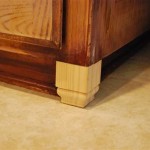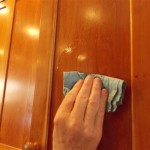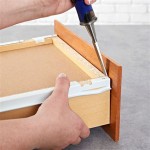Demystifying the Musty Odor in Kitchen Cupboards
The kitchen, arguably the heart of the home, often houses a symphony of aromas. Yet, when a lingering musty odor permeates its sacred space, it can dampen the culinary experience. If this unwelcome scent has found its way into your kitchen cupboards, it's time to uncover its hidden causes and banish it for good.
Dampness: The Culprit Behind Moisture-Loving Mold
Dampness is the primary culprit responsible for musty odors in kitchen cupboards. When moisture accumulates within the enclosed spaces of your cupboards, it creates an ideal environment for mold to thrive. Mold thrives in warm, humid conditions and can release musty spores that permeate the air and your cupboard's contents.
Common sources of moisture in kitchen cupboards include:
- Poor ventilation, leading to trapped moisture from cooking activities
- Leaks from nearby pipes or appliances
- Condensation from temperature fluctuations
- Storing wet or damp items inside the cupboards
Mold Growth: The Source of Musty Odors
Mold is a type of fungus that thrives on organic matter and moisture. In kitchen cupboards, mold commonly grows on food debris, spills, or moisture-laden surfaces. As mold grows, it releases musty-smelling spores into the air, causing the characteristic odor in your cupboards.
Food Debris and Spills: A Feast for Mold
Food debris and spills provide a rich banquet for mold. Crumbs, spills, or food residue that remain in the cupboards become a breeding ground for mold. These organic materials offer mold the nutrients it requires to flourish and release its unpleasant musty fragrance.
Poor Ventilation: Trapping Moisture and Odors
Adequate ventilation is crucial for preventing musty odors in kitchen cupboards. When cupboards lack proper ventilation, moisture becomes trapped, creating a humid environment that encourages mold growth. Good ventilation allows moisture to escape, reducing the risk of mold and its musty scent.
Cleaning Solutions for a Fresh-Smelling Kitchen
To combat musty odors in kitchen cupboards, a thorough cleaning is essential. Remove all items from the cupboards and inspect them carefully for any signs of mold. Discard any moldy items and clean the affected areas with a mold-killing solution.
Once the cupboards are empty, wipe down all surfaces with a mixture of warm water and white vinegar. Vinegar is a natural disinfectant that can kill mold and neutralize odors. Allow the cupboards to dry completely before returning the contents.
Preventing Musty Odors: Proactive Measures
Prevent musty odors from returning by implementing the following measures:
- Keep cupboards well-ventilated
- Wipe up spills immediately
- Store food in airtight containers
- Empty cupboards regularly and discard any expired food
- Inspect cupboards for leaks and repair them promptly
Conclusion
Musty odors in kitchen cupboards are a common nuisance, but they can be effectively eliminated by addressing their underlying causes. Addressing moisture issues, preventing mold growth, and practicing proper cleaning and storage techniques can help you restore freshness to your kitchen cupboards, ensuring a pleasant and inviting culinary space.

Musty Smell In Kitchen Cabinets Cupboards Causes Solutions

Why Do Kitchen Cupboards Smell Musty Homes Gardens

Mold In Kitchen Hotspots Causes Signs Prevention Tips

7 Easy Tips For Getting Rid Of Musty Smells

How To Get Rid Of Strange Odor In Bath Kitchen Cabinets Guilin

How To Get Rid Of Strange Odor In Bath Kitchen Cabinets Guilin

Damp And Mould In Kitchen Cupboards

Eliminate Unwanted Mildew Smell In Cabinets Handy Tips

Get Funky Musty Smells Out Of Your Cabinets With A Few Items You Already Own

Why Do Kitchen Cupboards Smell Musty Homes Gardens








